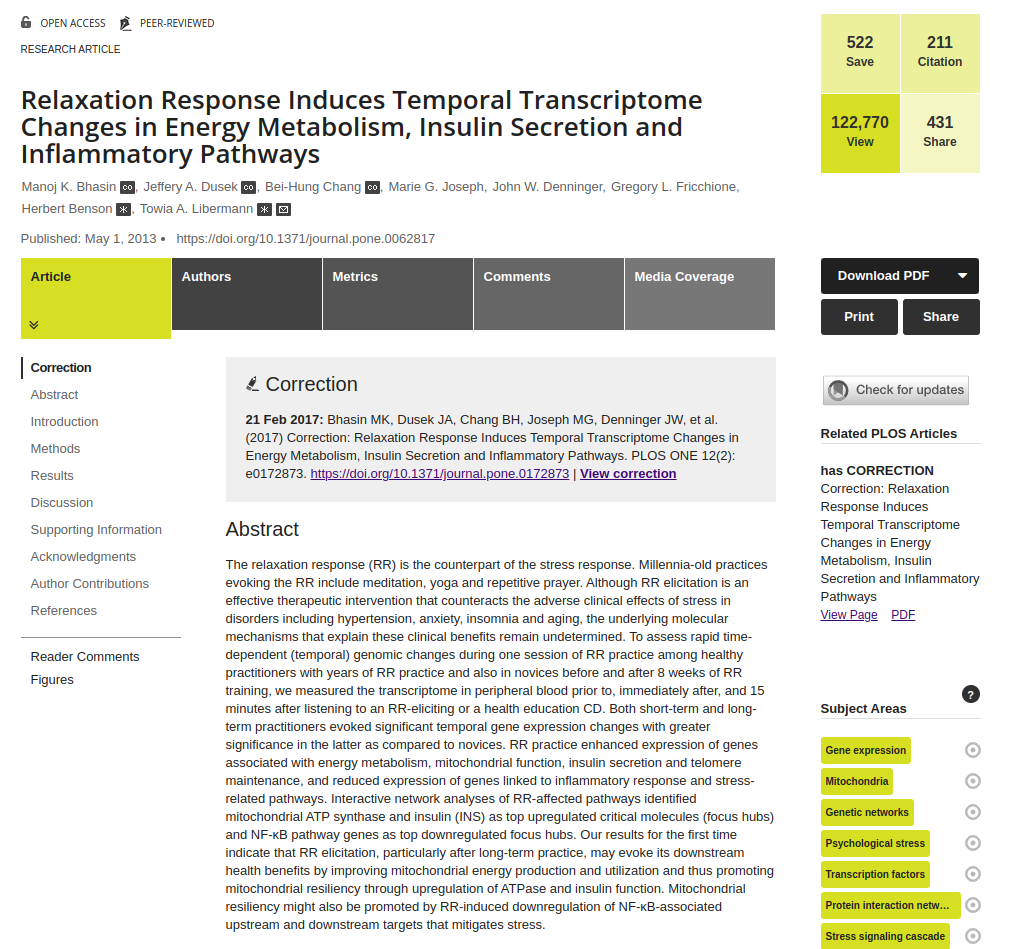The relaxation response (RR) is the counterpart of the stress response. Millennia-old practices evoking the RR include meditation, yoga and repetitive prayer. Although RR elicitation is an effective therapeutic intervention that counteracts the adverse clinical effects of stress in disorders including hypertension, anxiety, insomnia and aging, the underlying molecular mechanisms that explain these clinical benefits remain undetermined. To assess rapid time-dependent (temporal) genomic changes during one session of RR practice among healthy practitioners with years of RR practice and also in novices before and after 8 weeks of RR training, we measured the transcriptome in peripheral blood prior to, immediately after, and 15 minutes after listening to an RR-eliciting or a health education CD. Both short-term and long-term practitioners evoked significant temporal gene expression changes with greater significance in the latter as compared to novices. RR practice enhanced expression of genes associated with energy metabolism, mitochondrial function, insulin secretion and telomere maintenance, and reduced expression of genes linked to inflammatory response and stress-related pathways. Interactive network analyses of RR-affected pathways identified mitochondrial ATP synthase and insulin (INS) as top upregulated critical molecules (focus hubs) and NF-κB pathway genes as top downregulated focus hubs. Our results for the first time indicate that RR elicitation, particularly after long-term practice, may evoke its downstream health benefits by improving mitochondrial energy production and utilization and thus promoting mitochondrial resiliency through upregulation of ATPase and insulin function. Mitochondrial resiliency might also be promoted by RR-induced downregulation of NF-κB-associated upstream and downstream targets that mitigates stress.
Relaxation Response Induces Temporal Transcriptome Changes in Energy Metabolism, Insulin Secretion and Inflammatory Pathways
Publication
PLOS ONE
Abstract
Web and Email Links
Related Listings
Journal
Behavioral Medicine
The authors assessed data from 1,148 outpatients in a 10-week medical symptom reduction program to determine the effectiveness of a behavioral medicine intervention among somatizing patients. The program included instruction in the relaxation response, cognitive restructuring, nutrition, and exercise. Before and after the intervention, the patients were evaluated on the Symptom Checklist-90 Revised (SCL-90R), the Medical Symptom Checklist, and the Stress Perception Scale. They were di […]
Journal
Journal of the American Heart Association
·
Provides 37 pages of summaries from decades of research concerning how meditation affects heart related functioning (blood pressure, heart rate, etc.) Abstract Despite numerous advances in the prevention and treatment of atherosclerosis, cardiovascular disease remains a leading cause of morbidity and mortality. Novel and inexpensive interventions that can contribute to the primary and secondary prevention of cardiovascular disease are of interest. Numerous studies have reported on the […]
Journal
American Heart Journal
Background: The effect of intercessory prayer (IP) on outcome in cardiac cases has been evaluated previously, but results are controversial. The goals of the Study of the Therapeutic Effects of Intercessory Prayer (STEP) are to evaluate the effects of receipt of additional study IP and awareness of receipt of additional study IP on outcomes in patients undergoing coronary artery bypass graft surgery. STEP is not designed to determine whether God exists or whether God does or does not […]

